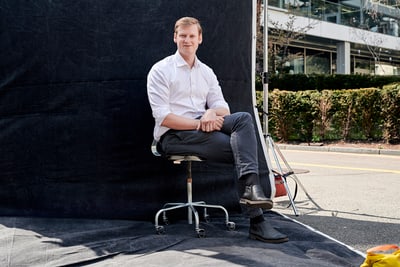
A fountain of youth for retirement reforms
Outline of a pension scheme to meet the needs of today’s grandchildren – or how the youth wings of political parties want to resolve the reform deadlock among the older generations. An alliance of the youth wings of the country’s conservative and liberal political parties wants to finally make retirement provision suitable for today’s grandchildren. Four presidents talk about how they want to get pension reform into gear.
When you are young, you should not have to worry about your retirement. Young people should be enjoying life, exploring the limits of freedom, making bold plans, being rebellious, saving the world, embarking on adventures, getting to know new things and investing in their education. This is the only way a society can move forward. It is one of the privileges of youth not to be a slave to the old system. Or this is the way things should be for a while at least.
The irony of history
But young people of today become old very early on. Now, 16-year-olds are forced to address matters such as our ageing society, salary deductions, redistribution and pension savings. Public officials in Bern welcome this development and are delighted when teenagers show a ‘problem-awareness’ of retirement provision before they have even embarked on their working lives. For years now, pension worries have topped the list of concerns for young people in Switzerland. The same cannot be said for their peers in Singapore, the US or Brazil.
This should not be cause for celebration, not even for a public official. If the biggest concern among 16-19-year- olds in a modern society – in particular one of the richest in the world – is their old-age pension, then something has gone wrong. It is obvious that ‘the elderly’ are to blame. For decades now, they have failed to install a pension system that is sustainable in the truest sense of the word – knowing full well that they will pass the systemic problems for which they are responsible on to their children and grandchildren.
The OASI system, which is repeatedly glorified as Switzerland’s greatest social achievement, has gone from being a blessing to a source of worry within the space of only a few decades. It was set up in 1948 specifically to alleviate people’s fear of poverty in old age. The irony of history! The inability of the Federal Council and parliament to tackle the urgently needed reforms has ensured that the OASI system is increasingly becoming what it actually was from the outset on closer inspection with its pay- as-you-go system: A Ponzi scheme at the expense of the young/working population and those not yet born. But this is not something we like to mention. The fact that this scheme is also becoming more and more widespread in occupational pensions and, against the logic of a funded system, redistributes money from the young to the old does not make things any better; on the contrary.
Grade: C minus
Occasionally, David Trachsel, president of the youth wing of the Swiss People’s Party (SVP), stands in front of a class of schoolchildren and asks how many pupils still expect to receive an old-age pension one day, as their grand- parents receive today. The outcome of these little surveys is almost always the same, he says. The vast majority of these young people are pessimistic and have no hope ofan old-age pension on the scale seen today. ‘In the most optimistic class, just a third of the young people were still confident about their retirement provision,’ says Trachsel. Thus, the adolescents indirectly give the established politicians and the administration a rather bad report; grade: unsatisfactory.

David Trachsel, (1994) is president of the youth wing of the Swiss People’s Party (SVP) and a member of the cantonal parliament of Basel Stadt. He has a bachelor’s degree in business administration and works as a client advisor at
a fiduciary. He is also managing director of the consumer organisation Vision Konsum.
«The second pillar has to be financed based on a proper funded scheme again, without any redistribution.»
One might say that these surveys offer no more than anecdotal evidence, but the findings of this small private study mirror the results that the Credit Suisse Youth Barometer, which measures the concerns of young people, has revealed time and again for years now. It is interesting to note that young people are not actually very familiar with the Swiss pension system. ‘Specific knowledge about retirement provision is shockingly poor among the young, as well as among the population at large,’ says Tobias Vögeli, co-president of the Young Green Liberals. ‘Young people might not be familiar with the specifics,’ says Trachsel, ‘but they intuitively sense that something is wrong. After all, they are capable of thinking logically.’ Indeed, it is obvious that pension promises that do not reflect demographic reality cannot be kept in the longer term. ‘The pension system is simply not fit for the future in its current form,’ says Sarah Bünter, president of the youth wing of The Centre.
Given the complexity of the issue and the obscure maze in conjunction with other welfare state measures, the limited knowledge of the pension system is hardly surprising. Schools could probably also do more to help. But when you are young, other issues are more important. ‘No one is interested in supplementary benefits in their mid-20s,’ says Matthias Müller, president of the Young Liberals of Switzerland (YLS). This wouldn’t be so bad if the ‘older generation’ – i.e. the people who are currently in power – would do their homework.
The older generation’s political horse trading
But today’s politicians are a long way off achieving that goal. The latest reform proposals also provide scant hope of any imminent turnaround to ensure the solid financing of old-age pensions. ‘At the moment, reforms only have a chance – if at all – if they are generously sugar-coated,’ says Müller. This is precisely why occupational pensions are actually at risk of becoming a mini-OASI. ‘This has to be prevented at all costs,’ says Müller. This sort of mechanism would not only run contrary to the system, but it would also be unsustainable. This is something on which the conservative and liberal youth wings agree. ‘Sustainability is the order of the day,’ says Bünter, ‘regardless of environmental issues or retirement provision.’
This is why the conservative and liberal youth wings no longer want to put up with the useless political horse-trading of the older generation. While the Young Socialists, together with their parent party, dream of a uniform basic pension for all with more or less maximum redistribution, the YLS, the youth wing of The Centre, the youth wing of the SVP, the Young Green Liberals and the youth wing of the Swiss Evangelical People’s Party have formed an alliance to finally make retirement provision suitable for today’s grandchildren.

Tobias Vögeli, (1995) is co-president of the Young Green Liberals and a member of the management of the Green Liberal Party of Switzerland. He has been studying law in Bern since 2016. Since 2018, he has been responsible for finance in his role as a municipal councillor (executive) for Frauenkappelen (BE).
«But we can reform the pension system only if we stand together now.»
‘If the conservative parties do not stand together, we will not be able to get the necessary reforms through,’ says Bünter. ‘And simply doing nothing,’ says Müller, ‘would cause collateral damage on a scale that nobody could possible want, least of all the young.’ The alliance of the youth wings arose out of necessity – precisely in view of this impending collateral damage, explains Vögeli. There are certainly differences between the individual parties on this issue. ‘But we can reform the pension system only if we stand together now.’
So what should happen now? A radical departure from the three-pillar system is not planned. ‘This system is one of the best in the world,’ says Müller. He explains that while the overall system makes sense, the current approach no longer plays by the rules of the game. The older generation lacks the political will to adjust the pension benefits or the retirement age to reflect demographic and market developments. Because of this political inertia, not only the OASI but also the occupational pension scheme is increasingly running into trouble. The pension funds need more and more money to pay their pensions and they are taking that money from their assets, contrary to the principle of a funded system.

Sarah Bünter, (1993), president of the youth wing of The Centre, works at a spatial planning company and is studying for a master’s degree in international relations at the University of St Gallen. She is also a member of the Christian Democratic People’s Party (CVP) leadership team for St Gallen and a CVP board member for the St Gallen/Gossau region.
«The pension system is simply not fit for the future in its current form.»
About CHF 7 billion is redistributed from the young to the old in the second pillar every year. This is a situation that the youth wings are not prepared to accept any longer. ‘The second pillar has to be financed based on a proper funded scheme again, without any redistribution,’ says Trachsel. In their joint response to the consultation process on the reform of the second pillar, the youth wings are thus calling for the conversion rate to be depoliticised. ‘In the future, the conversion rate has to be automatically based on objective actuarial criteria, such as life expectancy or market developments,’ says Bünter.
Work has to be worthwile
The adjustment of the retirement age to reflect increased life expectancy is naturally also a long overdue move from the perspective of the youth wings. ‘We have to move away from forced retirement,’ says Vögeli. Instead, the retirement age should be increased quickly, irrespective of gender, and also made more flexible. The idea is that a more flexible system will strengthen personal responsibility. ‘People who work more and longer should also receive a higher pension,’ says Müller. Calls for an increase in the retirement age are likely to remain on the political agenda, particularly since the Young Liberals’ pension initiative is due to be submitted this summer.
The youth wings generally agree that work has to be worthwhile - considerably worthwhile. ‘We can afford our generous social benefits only if we cultivate and maintain our typically Swiss work ethic,’ says Trachsel. But currently a whole series of social measures run diametrically across this principle, such as progressive taxation, premium reductions and childcare subsidies. Those who voluntarily reduce their workload in order to have more free time have a good chance of receiving state subsidies such as these. ‘Many people are not even aware,’ says Bünter, ‘of the advantages that those who opt to work less than they could enjoy today.’
The youth wings want to see the abolition of these misguided incentives in the retirement provision system and introduce a bonus-penalty system linked to a reference age. People who work more and longer should also receive a higher pension. As a logical consequence of this increased flexibility, working past retirement age has to be made more attractive, says Müller, who believes that reduced income tax would be a possible option. The old- age credits should also be adjusted since they artificially inflate the costs of the work of older employees.
New working world
‘Pension reform also has to take account of how the modern world of work is resulting in different career trajectories,’ says Bünter. Jobs for life and uninterrupted periods of employment are outdated concepts. Nowadays, people do project-based work, work for several employers at the same time, take a break from work entirely or are self-employed on a part-time basis. The current system is not, or is only very poorly, geared to all of these special cases. This is something that the youth wings want to change. They want the coordination deduction to be reduced or even abolished, because it puts part-time employees at a disadvantage in terms of occupational pensions. In addition, young adults should be allowed to pay into the second pillar from the age of 18 and not only from the age of 25, as is the case today – this would benefit those who complete an apprenticeship and embark on working life earlier than university graduates. This would at least partially compensate for the disadvantages of the generally lower incomes among non-graduates.
In summary, the concept put forward by the conservative and liberal youth wings can be described as an approach based on reason, pragmatism and a solid grasp on reality, and not by political tactics or a desire a name for themselves. Consequently, it comes as little surprise that the concept is also praised by the experts. Martin Eling, insurance economist and professor at the University of St Gallen, commented in NZZ am Sonntag that what he likes about the young politicians’ reform plan is that they are not primarily pursuing their own interests, but are looking for fair solutions.

Matthias Müller, president of the Young Liberals, studied law and economics in St Gallen. He is currently working towards a doctorate in takeover law at the University of Zurich and works as a trainee lawyer at a large commercial law firm in Zurich.
«Simply doing nothing would cause collateral damage.»
The youth wings are using a broad-based campaign in a quest to make their concept heard. Let’s hope that they succeed. After all, nothing less is at stake than the good old intergenerational contract.
Retirement provision: parliament will decide
In November 2020, the Federal Council submitted the proposal on reforming occupational pensions to parliament. The core of the proposal is the reduction in the OPA minimum conversion rate to 6.0 per cent in a single step, which the Swiss Insurance Association (SIA) considers to be an essential, pressing move. This requires targeted and needs-based compensation within the second pillar for the transitional generation, which will be hit particularly hard.
The SIA clearly rejects the pension surcharge proposed by the Federal Council, however, which would apply indefinitely and be financed on a pay-as-you-go principle that is alien to the system. In February 2021, the National Council’s Social Security and Health Committee (SSHC-N) approved the submission unanimously. The Federal Council had already adopted the proposal on measures to stabilise the OASI system in August 2019.
During the consultation procedure, the SIA pointed out the need to make adjustments on both the income and the benefits side. In February 2021, the Council of States’ Social Security and Health Committee (SSHC-S) concluded its detailed consultation procedure on the proposal. The consultation in the two Councils will take place over the course of 2021.
Glossary
The first pillar of the pension system (the OASI system) is financed on a pay-as-you-go basis. Current expenses (mainly pensions) are covered by current income (mainly
contributions paid by employees and employers, contributions from the federal government and VAT income).
The second pillar, occupational pensions (OPA), is financed based on a funded model. As with a savings account, retirement assets are saved in the pension fund for each insured person during their working life.
Annual retirement credits are credited to the pension fund to build up the retirement assets. These are defined as a percentage of the coordinated salary. The amount depends on the age of the insured person.
The coordination deduction corresponds to 7/8 of the maximum ordinary OASI pension (as at 2021: CHF 25,095). No retirement credits are credited to this part of the salary.
The conversion rate, together with the retirement assets available on retirement, determines the amount of the pension in the second pillar. A conversion rate of six per cent means that a pensioner receives an annual pension of CHF 6,000 for every CHF 100,000 francs saved in retirement assets.
This article was published as part of SIA's annual magazine «View» .
